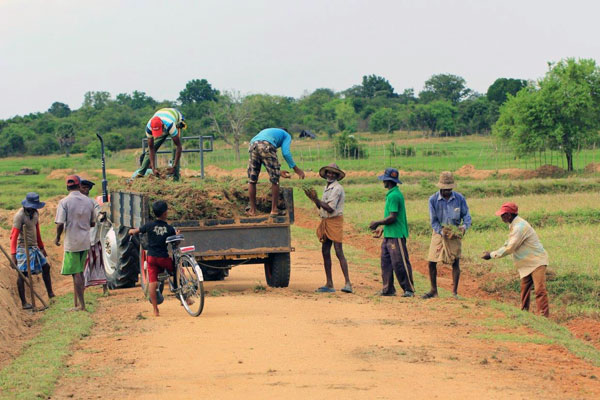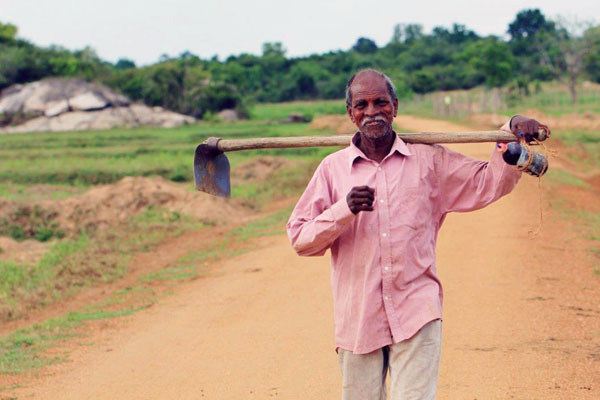Stories from the Field: Improving Accessibility in Villages in Batticaloa District

Children cycling along the newly rehabilitated road in Eralakulam.
Well maintained internal gravel roads are vital for the efficient functioning of village life as they are used regularly by residents to travel to workplaces, agricultural lands and children’s schools as well as to access towns and marketplaces. Badly maintained roads can severely inconvenience people, particularly during the monsoon rains. To improve accessibility in Eralakulam GN Division in Batticaloa, a 7 km stretch of road was recently rehabilitated with funding from the Improving Living Conditions in Returnee Areas of Sri Lanka through Housing project.
The project Improving Living Conditions in Returnee Areas of Sri Lanka through Housing is funded by the European Union, Government of Australia and the Swiss Agency for Development and Cooperation (SDC). It is supporting the construction of community infrastructure, including 38 km access roads in the North and East of Sri Lanka. The overall project is implemented by UN-Habitat and SDC through a participatory process in collaboration with the local communities and Government authorities.
The Eralakulam Grama Niladhari Division, located in Eravur Pattu DS Division, consists of 39 small villages. The population of the GN division is approx. 1,315 people consisting of 319 families. Eralakulam was severely affected by the conflict with its residents facing multiple displacements and hardships over the years. The intensification of the conflict in the surrounding area resulted in many families relocating to safer areas in the towns of Eravur and Batticaloa. With the end of the conflict in May 2009, families gradually resettled in their villages. The GN division needed special assistance to recover from the many challenges faced during to the conflict.
The traditional livelihoods of the Eralakulam community include agriculture, livestock farming and firewood collection. Several donor and government funded programmes have provided support to the village to return to normality. The Improving Living Conditions in Returnee Areas of Sri Lanka through Housing Project has funded the construction of 175 houses in this GN division. In addition, damaged infrastructure including preschools, community buildings, and an irrigation tank have been rebuilt with the support of several donors and the Government of Sri Lanka.

Turfing of the road side in progress.
In September 2013, at the Settlement Improvement Planning workshop conducted by UN-Habitat, the Eralakulam community identified the rehabilitation of an internal gravel road from Eralakulam to Mullivedduwan village as a priority infrastructure initiative for the village. This renovated road would directly benefit 319 families who regularly use it as their main access road, connecting the village to Perumaveli, Elukku, Periyavedduwan, Kuduwettai and Velleyandachenai villages and to access their agricultural lands.
In keeping with UN-Habitat’s participatory methodology, the implementation of this initiative was handed over to local Community Based Organisations. The Rural Development Society of Eralakulam and the Women’s Rural Development Society of Perumaveli were selected to manage the road rehabilitation work, with each CBO receiving a 2.5 Km stretch of road. The project commenced in January 2014 with the Pradeshiya Sabha (Local Government Authority) of Eravur Pattu closely collaborating with UN-Habitat for the approvals of the road design. The Pradeshiya Sabha also provided support to widen and expand the existing road. The Grama Niladhari Officer and the Rural Development Officer supported UN-Habitat by monitoring the physical progress of the road and helping organise meetings with the community.
In November 2014, the two community organisations successfully completed a 5 km stretch of road rehabilitation. The improved road included a drainage system, two Hume pipe culverts, one box culvert and two causeways to enhance storm water drainage. With the completion of this activity, the Eralakulam community made a special request to the Government authorities to extend the road by a further 2 km considering its added benefits to the residents. This request was favourably considered, and in November 2014, with additional funding from the project, the Rural Development Society of Eralakulam commenced the rehabilitation of the additional road. The construction work was completed in May 2015.
“Earlier, this road was very narrow and full of pot holes. The road sides were covered in shrub jungle. Now it is a wide and well maintained road that is used by all the residents of our village.” Mr. S. Thurairatnam, the RDS President of Eralakulam stated.
At the start of the project, the responsibilities of the CBO members were clearly identified and work was monitored through regular meetings and field visits. The RDS and WRDS members were provided training to enhance their leadership and financial management capacities. The technical supervision of the road construction was provided by UN-Habitat and the Pradeshiya Sabha technical staff to ensure the quality and standard of road works.

Farmers use the road daily to access their fields.
“UN-Habitat gave us ownership of this initiative from the very beginning due to the community centred implementing method. We learned many new skills, especially good procurement practices. We also received training on book keeping and management, which was very useful.” Mrs K Maheswary, the President of the Premaveli WRDS, stated.
Mr. S. Weerasingham, Grama Niladhari of Eralakulam village was grateful to the donors for funding the road construction. “The rehabilitation of this internal road was very timely. The vulnerable residents of Eralakulam have been blessed through this project to realise some of their basic needs – first through the construction of permanent houses and now with this safe access road. We are truly grateful to the donors for supporting the Sri Lankan people through these projects”.
The Improving Living Conditions in Returnee Areas of Sri Lanka through Housing Project is being implemented from January 2013 to June 2015 in the districts of Killinochchi, Mullaitivu and Mannar in the North and Batticaloa in the East. The project will support the reconstruction of 4,600 houses and a number of infrastructure initiatives including 12 preschools, 14 community centres, 17 wells, and the rehabilitation of approximately 38 km of internal access roads.
